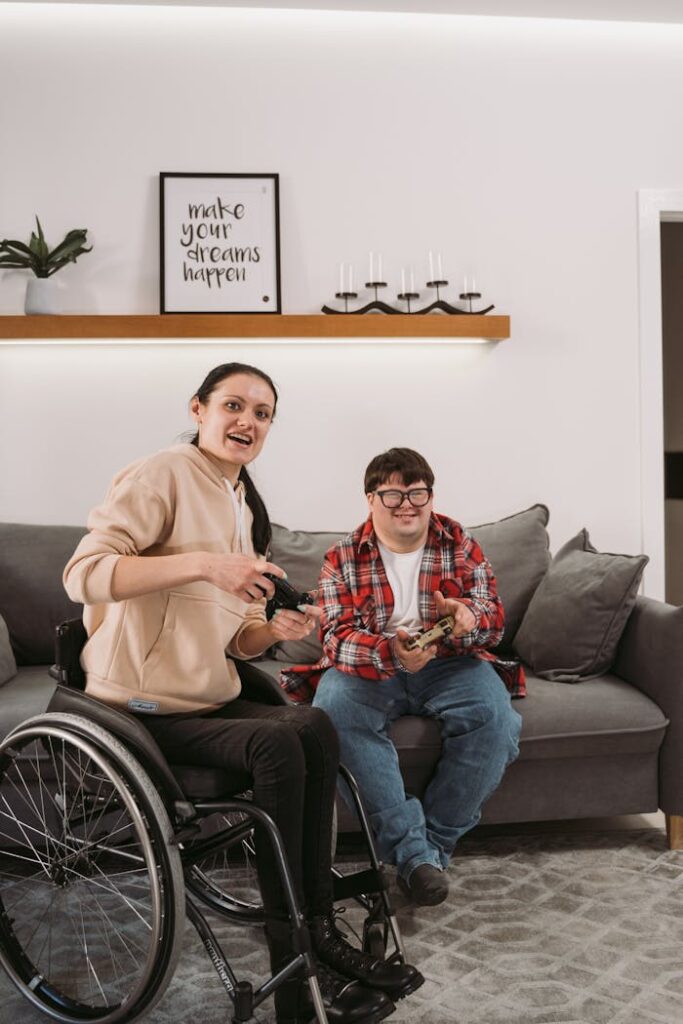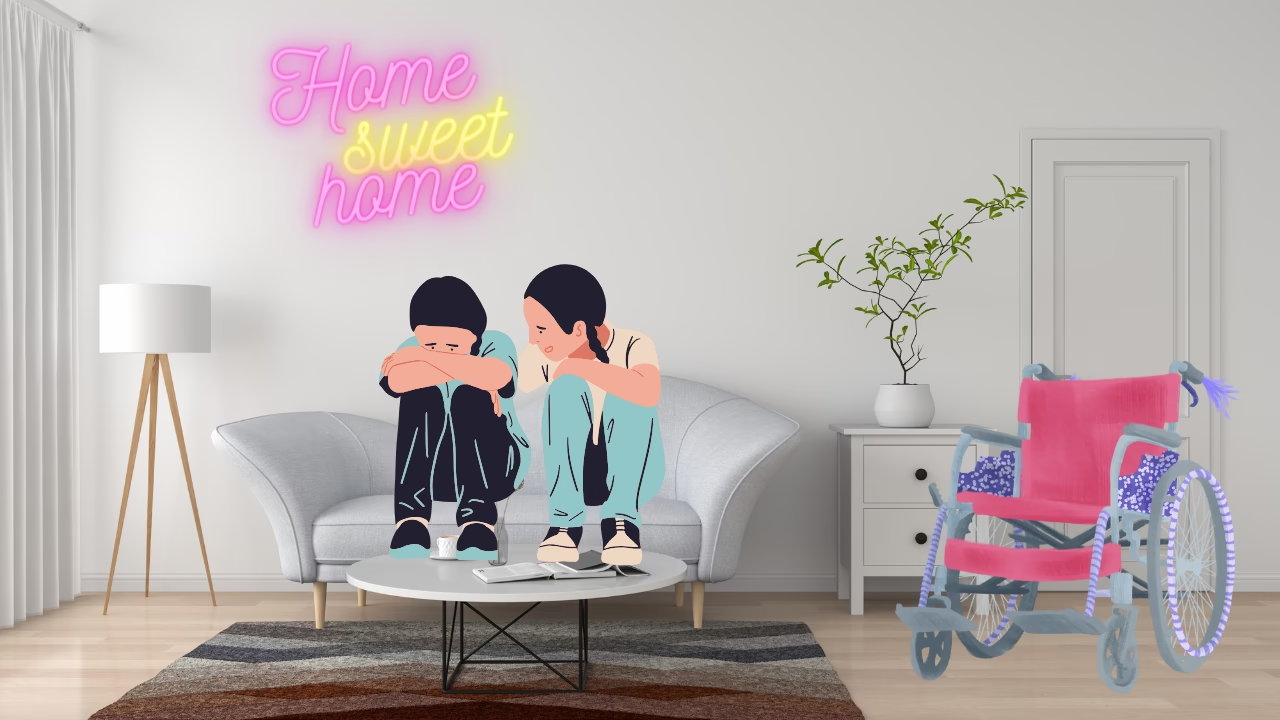Do you feel Unloveable or A Burden Now that You’re Housebound?
Have you ever felt like you’re the only one going through a severe health crisis or disability? Are you reliant on others for daily living assistance and feel unloveable because you’re too much of a burden? Especially when you’re housebound, these thoughts can become overwhelming. But there’s hope. You’re not alone; there are ways to overcome these thoughts and find joy and connection.
Society made me feel like a loser
I had a vibrant social life and was on track in the profession that I loved. Then, I was viciously assaulted, and my ability to work decreased while my feelings of lost social status increased.
No one could relate and I feel Unloveable
Savings, home, family, friends and an enriched life were replaced by four rented walls far from all I had grown up with. My friends fell away, and I don’t blame them. They had befriended an outgoing business professional, and I could no longer be this.

Where do these feelings of being a burden or unloveable come from?
Societal pressures
Through propaganda, we’re made to think we’re only valuable to society if we bring in tax money. We’re portrayed as worker units who are a burden or a taxpayer—and nothing in between.
Suppose a health issue is severe enough that you cannot work. In that case, you’re vilified for getting government support payments.
Personal pressures
Relying on family, partners, or friends to assist you with daily living unbalances the power in your relationship. When you’re isolated, feelings can intensify, making you believe you’re a burden to others. But these feelings, while very real, don’t reflect the value of a sentient human being.
Challenging Negative Thoughts
One effective way to combat feelings of being unlovable or burdensome is through cognitive-behavioural techniques (CBT). CBT helps you identify, challenge, and change negative thought patterns. Here are a few methods you can try:
01
Journaling When you Feel Unloveable
Start by identifying negative thoughts such as “I’m a burden” and challenge them with positive reframes like “I bring unique value to my relationships.”
Keeping a journal can help you track these thoughts over time. Write down your negative thoughts and then counter them with positive affirmations. Over time, you’ll start noticing patterns and be better at challenging these thoughts as they arise.
02
Be Your Own Cheerleader
So, being my own cheerleader works for me. Still, it is only comfortable for some people because spiritual leaders infer you have a big ego problem! I’m alone at home, so who else will pick me up?
My favourite tool is the mirror technique, which I use when I stand before myself and compliment how I handle this challenging situation. You can tell yourself at intervals in the day that you’re doing well. Make it genuinely believable, though.
03
Thought Stopping
When a negative thought pops up, firmly tell yourself, “Stop!” This might seem simple, but it can effectively break the cycle of negative thinking.
You can even visualize a stop sign or something else that signifies stopping to reinforce the message. I watch my self-talk and tweak any negativity by giving self-praise out loud.
Cognitive Restructuring
This involves stepping back and questioning the evidence for your negative thoughts. Ask yourself, “Is this thought based on facts or feelings?” or “What evidence do I have that this thought is true?”
Often, negative thoughts are based on assumptions rather than reality. By questioning and restructuring these thoughts, you can see them in a more balanced and realistic light.
Visualizing Being Loved
Visualization involves creating a mental image of a positive outcome. When you’re feeling down, close your eyes and picture yourself in a situation where you feel happy, loved, and valued.
Imagine the details – who you’re with, what you’re doing, and how you think. This can help shift your focus from negative thoughts to a more positive outlook.
Mindfulness and Meditation
Mindfulness involves being present in the moment and observing your thoughts without judgment. Meditation can help you practice mindfulness and reduce stress.
Try spending a few minutes daily focusing on your breath and letting go of negative thoughts. Apps like Headspace or Calm can guide you through mindfulness and meditation exercises.
Tell Others that You feel Unloveable
Sometimes, getting an outside perspective can be incredibly helpful. Contact a trusted friend or family member for honest feedback about your strengths and contributions.
Often, others see positive qualities in us that we overlook. This external validation can help reinforce a more positive self-image.
Positive Affirmations
Create a list of positive affirmations that resonate with you. These can be statements like “I am deserving of love and hugs,” “I am so brave getting through this,” “I am awesome to remember my pills every day,” or “I am stronger than I believe.”
Repeat these affirmations daily out loud, especially when you catch yourself thinking negatively. Over time, these affirmations can help reshape your mindset.
Hypnosis
This is another of my favourite tools for combating negativity and boosting self-esteem. It involves entering a deeply relaxed state that makes you more open to positive suggestions. You can work with a professional hypnotherapist or use self-hypnosis techniques.
Professional Hypnotherapy: A trained hypnotherapist can guide you through sessions tailored to address your concerns. They can help implant positive affirmations and coping mechanisms directly into your subconscious mind, making adopting new, healthier thought patterns easier.
Self-Hypnosis: If professional sessions aren’t an option, self-hypnosis is another effective method. You can find audio recordings and scripts to help you relax and introduce positive suggestions. Find a quiet place, get comfortable, and listen to a guided hypnosis session aimed at enhancing self-love and reducing feelings of being burdensome. Over time, these sessions can help you internalize more positive beliefs about yourself.
The Importance of Self-Compassion
Practising self-compassion is crucial for our overall well-being. It involves treating yourself with the kindness and understanding you would offer a dear friend

Discovering joy and purpose from the comfort of home
Small gestures, such as composing a heartfelt letter to yourself, practising mindfulness exercises, or pausing to recognize and affirm your emotions, can significantly impact your mental and emotional well-being.
Recommended resources for practising self-compassion
Resources like Kristin Neff’s work on self-compassion provide valuable insights and practical techniques for cultivating a more compassionate and nurturing relationship with ourselves. See Kristin Neff: Overcoming Objections to Self-Compassion
Kristen Neff, the world’s leading researcher of self-compassion and founder of the Mindful Self-Compassion program, considers—and rebuts—some of the main objections to treating yourself with kindness.

Connecting with Others
Human connection is vital when you’re low and feel unloveable or a burden. Even if you are housebound, you can reach out through online communities or support groups. Start small by reconnecting with an old friend or joining a social media group that shares your interests. Remember, meaningful connections are about quality, not quantity.
Address the Balance in Carer Relationships
Finding a way to create balance when receiving support for daily living from loved ones can be incredibly beneficial. Think about small yet meaningful gestures you can offer in return. For instance, could you call a supplier to resolve an issue while they’re at work? Maybe you could cat-sit, watch the kids, offer them a night out, or create a piece of artwork for their home.
No matter how small, these acts help maintain the sense of a reciprocal relationship. Ensuring the dynamic feels like a friendship, not just a caregiver-recipient relationship, is essential. This mutual exchange supports your loved one and reinforces your sense of contribution and worth.


Finding Purpose and Joy
Discovering pastimes that bring you joy can significantly improve your sense of self-worth. Whether picking up a new hobby like painting, writing, or even an online class, engaging in something you love can be fulfilling and empowering. Many people have found new passions and purpose from the comfort of their homes.
Professional Help and Resources When You Still Feel Unloveable
If you still feel unloveable or a burden on others, seeking help from a mental health professional could be transformative.
Numerous resources are available from hotlines to online therapy platforms and self-help books. Remember, seeking help is better than suffering alone, and you deserve to experience the best quality of life possible.

I Hope you no longer Feel Unloveable
Feeling unloveable is a painful and isolating experience but not permanent. You can overcome these feelings by challenging negative thoughts, practising self-compassion, connecting with others, maintaining balance in your relationships and finding purpose. Remember, there is always hope, and you deserve love and happiness. I wish you the very best life.








Comments are closed.